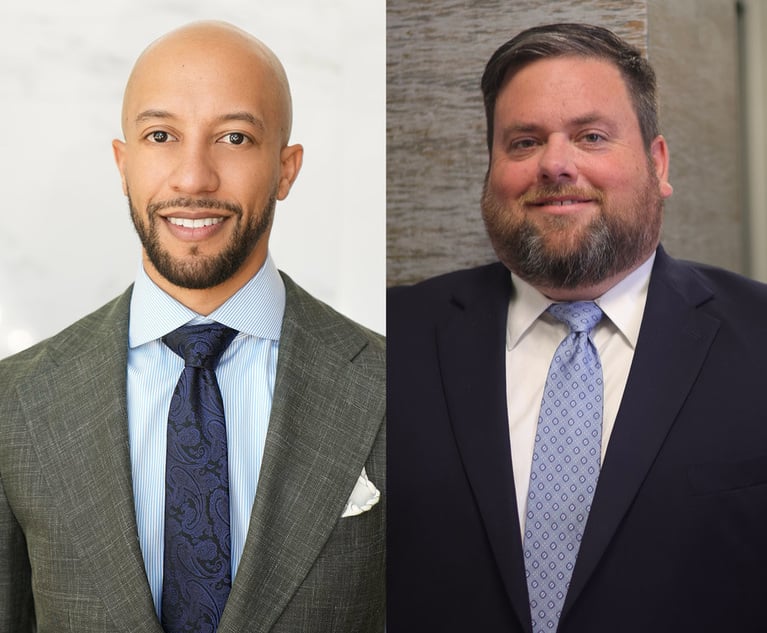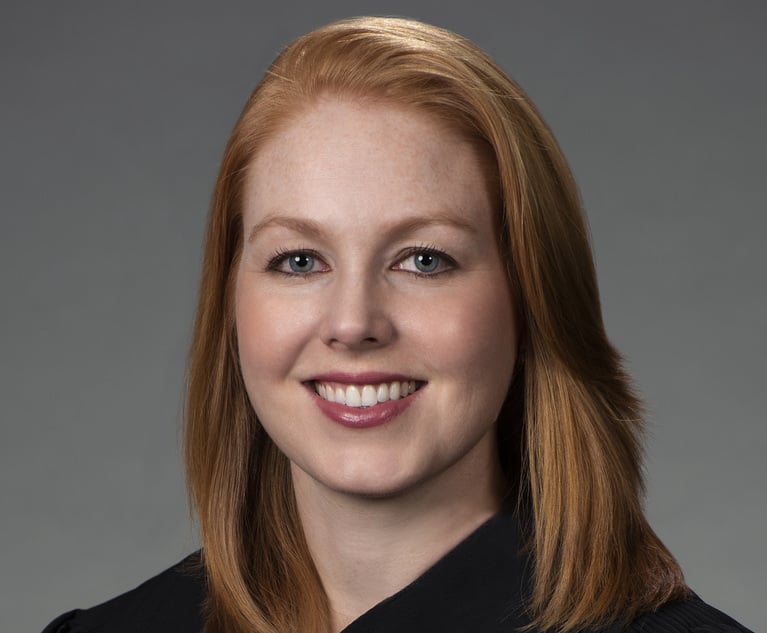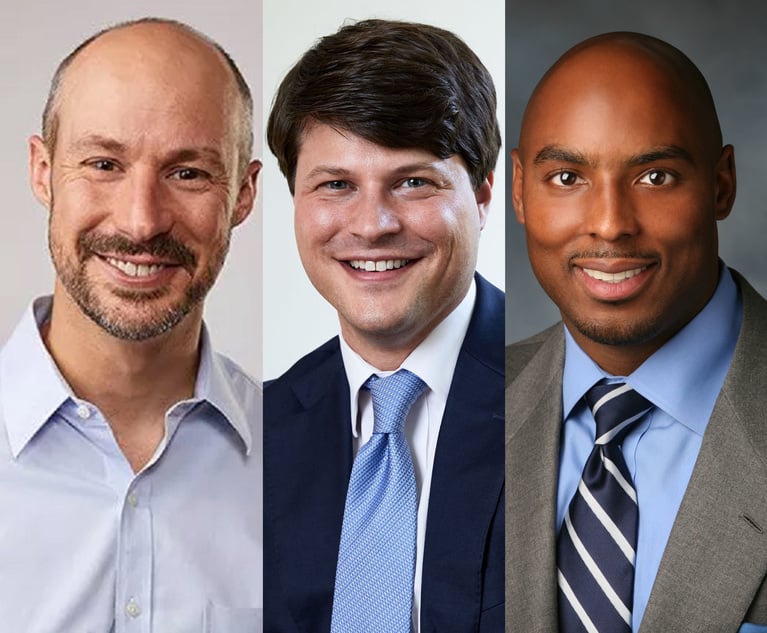Lawyer Booted From Class Action Says He Was Cheated Out of $2.6M in Legal Fees
Following an $80 million settlement, an Indiana lawyer is fighting for what he says is his fair share of the $26 million fee award.
January 10, 2020 at 01:26 PM
6 minute read
 Judge Richard Story, U.S. District Court for the Northern District of Georgia. (File photo)
Judge Richard Story, U.S. District Court for the Northern District of Georgia. (File photo)
A Georgia law firm is accused of scheming to cheat its former co-counsel out of nearly $2.6 million in legal fees, according to a series of court filings related to an $80 million MetLife class action settlement.
The court awarded more than $26 million in attorney fees as part of the July settlement, but M. Scott Barrett of Barrett Wylie in Indiana said his share awarded—more than $134,000—is a fraction of what he really should have gotten.
In a series of filings entered after the settlement was approved, Barrett said he was an integral part of the plaintiffs' team until the lead lawyer, John Bell Jr. of Augusta's Bell & Brigham "orchestrated" his removal.
Barrett said Bell—with whom he has a long history of co-counseling on class actions—had insisted that any fees he ultimately received would be totally at Bell's discretion, "if and when there might be a fee."
When Barrett protested, Bell purportedly manipulated the lead plaintiff and class representative, Laura Owens—whom Barrett had never met—to terminate his representation, which he was obliged to do.
Barrett argued that, his withdrawal notwithstanding, he should be paid 10% of the fee award, not a figure calculated on the hours he put into the case.
"Between April 24, 2014, and May 8, 2017, Barrett was actively involved in the prosecution of this matter," said his September motion asking the court to allocate fees.
"During that time, over 140 docket entries were made, including multiple declarations from Barrett. Motions to dismiss and for summary judgment had been filed, responded to, and successfully defeated. Discovery had been completed and an initial motion to certify the class had been filed."
The settlement agreement approved by U.S. District Judge Richard Story of Georgia's Northern District allocated $25 million in fees and $1.6 million in expenses to the plaintiffs' counsel—nine lawyers, including Barrett.
The others include Bell and his partner, Leroy Brigham; Jason Carter and Michael Terry of Bondurant, Mixson & Elmore; Cleveland, Georgia, solo Todd Lord; William Dobson and Michael Lober of Lober & Dobson in LaFayette, Georgia; and Oxendine Law Group principal John Oxendine.
Ruling on a motion by the plaintiffs' counsel, U.S. District Judge Richard Story of the Georgia's Northern District used the "lodestar" method to calculate Barrett's portion of the award based on the hours he reported working on the case, rather than on a percentage basis of the fee award.
In his final order approving the settlement, Story specified that the issue of Barrett's fees would not delay the settlement of the class' claims.
In a Dec. 26 order, Story said Barrett's share came to $134,311.
Barrett's lawyer, Cochran & Edwards partner R. Randy Edwards, said in a motion to reconsider that the judge should at minimum reopen discovery and allow in evidence "because the court's quantum meruit analysis is devoid of crucial and necessary findings of fact required under [federal rules] and to make an equitable allocation.
"This lack of findings has led to the anomalous result that Barrett's allocation should be a scant one half-of one percent of the total attorneys' fee. How can this be?" Edwards said.
In response, the remaining plaintiffs lawyers argued that well-settled Georgia law makes clear that an attorney discharged from a case before it is resolved is not entitled to a contingency fee.
Further, they said, Barrett has provided "no evidence of any services he actually rendered for the benefit of Ms. Owens or the class she represents."
Story has not yet ruled on Edward's Dec. 31 motion.
Barrett filed another motion on Jan. 7 in opposition to Story's division of fees after the plaintiffs filed a motion to approve it, arguing that "limited discovery and an evidentiary hearing" will allow the court to determine a proper split.
"Alternatively," it said, "if the court is not inclined to do this, Barrett asks that he be allocated 10% of the total amount of the fee awarded as a minimum allocation."
In an interview, Edwards said that—should those efforts prove unavailing—he can "virtually guarantee" that there will be an appeal.
The 10% figure, he said, is based upon Barrett and Bell's "17-year track record of working together on these types of cases."
As detailed in Barrett's September motion for allocation, Bell, Barrett and three other lawyers not involved in the MetLife case began working together on retained asset account class actions several years ago.
They originally had a co-counseling agreement that any fee awards would first split 10% to each firm, with the remainder based on hours billed.
Bell became "dissatisfied" with the original arrangement, and it was reworked so that local counsel and the referring lawyer would each get 10% off the top. Bell's firm got 50% of the balance, Barrett's got 30%, with the by then two remaining members splitting the last 20%.
"No one ever got 0.5% of the total, no matter what they did," Edwards said.
"Historically, Scott would be responsible for working up discovery, reviewing documents, determining damages, working with experts and so on, while John would take depositions and argue in court," Edwards said.
"It always worked out that Scott would get 15 or 20% of the award," he said. "In this case he was terminated two-thirds of the way through, and we feel he should be entitled to the minimum to which he was usually entitled."
Terry declined to discuss the fee dispute.
"All I can say is we're sorry it had to come a judicial resolution, but it was resolved," he said. "We think Judge Story got it right."
This content has been archived. It is available through our partners, LexisNexis® and Bloomberg Law.
To view this content, please continue to their sites.
Not a Lexis Subscriber?
Subscribe Now
Not a Bloomberg Law Subscriber?
Subscribe Now
NOT FOR REPRINT
© 2025 ALM Global, LLC, All Rights Reserved. Request academic re-use from www.copyright.com. All other uses, submit a request to [email protected]. For more information visit Asset & Logo Licensing.
You Might Like
View All
Trial Court Had No Authority to Reopen Voir Dire After Jury Impaneled in Civil Case, State Appellate Court Rules

'Pushed Into Oncoming Traffic': $5.85M Settlement in Mediated Auto Tort
6 minute read
Justice Known for Asking 'Tough Questions' Resolves to Improve Civility
4 minute read
Trending Stories
- 1South Florida Attorney Charged With Aggravated Battery After Incident in Prime Rib Line
- 2'A Death Sentence for TikTok'?: Litigators and Experts Weigh Impact of Potential Ban on Creators and Data Privacy
- 3Bribery Case Against Former Lt. Gov. Brian Benjamin Is Dropped
- 4‘Extremely Disturbing’: AI Firms Face Class Action by ‘Taskers’ Exposed to Traumatic Content
- 5State Appeals Court Revives BraunHagey Lawsuit Alleging $4.2M Unlawful Wire to China
Who Got The Work
J. Brugh Lower of Gibbons has entered an appearance for industrial equipment supplier Devco Corporation in a pending trademark infringement lawsuit. The suit, accusing the defendant of selling knock-off Graco products, was filed Dec. 18 in New Jersey District Court by Rivkin Radler on behalf of Graco Inc. and Graco Minnesota. The case, assigned to U.S. District Judge Zahid N. Quraishi, is 3:24-cv-11294, Graco Inc. et al v. Devco Corporation.
Who Got The Work
Rebecca Maller-Stein and Kent A. Yalowitz of Arnold & Porter Kaye Scholer have entered their appearances for Hanaco Venture Capital and its executives, Lior Prosor and David Frankel, in a pending securities lawsuit. The action, filed on Dec. 24 in New York Southern District Court by Zell, Aron & Co. on behalf of Goldeneye Advisors, accuses the defendants of negligently and fraudulently managing the plaintiff's $1 million investment. The case, assigned to U.S. District Judge Vernon S. Broderick, is 1:24-cv-09918, Goldeneye Advisors, LLC v. Hanaco Venture Capital, Ltd. et al.
Who Got The Work
Attorneys from A&O Shearman has stepped in as defense counsel for Toronto-Dominion Bank and other defendants in a pending securities class action. The suit, filed Dec. 11 in New York Southern District Court by Bleichmar Fonti & Auld, accuses the defendants of concealing the bank's 'pervasive' deficiencies in regards to its compliance with the Bank Secrecy Act and the quality of its anti-money laundering controls. The case, assigned to U.S. District Judge Arun Subramanian, is 1:24-cv-09445, Gonzalez v. The Toronto-Dominion Bank et al.
Who Got The Work
Crown Castle International, a Pennsylvania company providing shared communications infrastructure, has turned to Luke D. Wolf of Gordon Rees Scully Mansukhani to fend off a pending breach-of-contract lawsuit. The court action, filed Nov. 25 in Michigan Eastern District Court by Hooper Hathaway PC on behalf of The Town Residences LLC, accuses Crown Castle of failing to transfer approximately $30,000 in utility payments from T-Mobile in breach of a roof-top lease and assignment agreement. The case, assigned to U.S. District Judge Susan K. Declercq, is 2:24-cv-13131, The Town Residences LLC v. T-Mobile US, Inc. et al.
Who Got The Work
Wilfred P. Coronato and Daniel M. Schwartz of McCarter & English have stepped in as defense counsel to Electrolux Home Products Inc. in a pending product liability lawsuit. The court action, filed Nov. 26 in New York Eastern District Court by Poulos Lopiccolo PC and Nagel Rice LLP on behalf of David Stern, alleges that the defendant's refrigerators’ drawers and shelving repeatedly break and fall apart within months after purchase. The case, assigned to U.S. District Judge Joan M. Azrack, is 2:24-cv-08204, Stern v. Electrolux Home Products, Inc.
Featured Firms
Law Offices of Gary Martin Hays & Associates, P.C.
(470) 294-1674
Law Offices of Mark E. Salomone
(857) 444-6468
Smith & Hassler
(713) 739-1250






